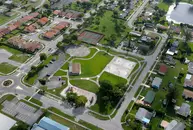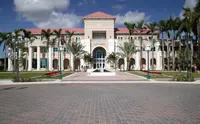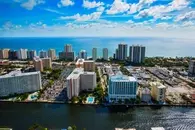Florida Contractor License Search
What You Should Know about Hiring a Contractor in Florida
The Florida Department of Business & Professional Regulation (DBPR) receives over 2,000 complaints about fraudulent and unauthorized contractors annually. The state's regulatory body has only licensed about 98,000 contractors in Florida. It is crucial to hire appropriately licensed, insured, and experienced contractors for your projects to ensure that:
- The work is completed safely and satisfactorily
- All relevant codes and regulations are adhered to
- You are insulated from financial and legal liabilities in the event of work-related accidents and injuries
As such, you should always check your prospective contractor's credentials before hiring; failing to do this can cost you time and money and even put your safety at risk. Taking the following points into account when hiring contractors in Florida can also help you select the right professionals:
- Who Is a Contractor in Florida?
- How to Search for a Contractor's License in Florida
- Penalty for Hiring a Contractor Without a License in Florida
- How Much Does a Contractor Charge in Florida?
- Tips for Hiring a Contractor in Florida
- Is Your Contractor Insured and Bonded as Required by Florida Statutes?
- Top Home Improvement Scams in Florida
- How to Report Fraudulent Florida Contractors
Who Is a Contractor in Florida?
Contractors are individuals who agree to offer services to interested customers for compensation. Agreements may be oral or written, and the offered services often involve building new structures or improving, altering, subtracting from, or demolishing existing buildings and structures. Florida contractors are regulated by the state's Department of Business and Professional Regulation (DBPR), and they must be appropriately licensed by this agency's Construction Industry Licensing Board before offering their services. Note that licenses for electrical work are issued separately by the DBPR's Electrical Contractors' Licensing Board. The DBPR issues two main types of licenses:
- Certified Licenses: contractors with these licenses can provide their services in any jurisdiction across the state.
- Registered Licenses: contractors with these licenses can only work in specified jurisdictions.
Licensed Florida contractors are further categorized into three main classes:
- General Contractors: general contractors oversee construction and home improvement projects and coordinate the activities of other professionals involved in these projects. While these contractors are usually responsible for the day-to-day running of the project, they may also perform actual construction and repair work (not including plumbing, roofing, electrical, HVAC, and sheet metal work). Sub-classifications of these contractors include the following:
- Building Contractors: these contractors' authorized scope of services is limited to the construction of commercial buildings and single or multiple-dwelling residential buildings that are not more than three stories high, the construction of accessory-use structures in connection with these buildings, and non-structural remodeling, repair, or improvement of any size buildings.
- Residential Contractors: these contractors' authorized scope of services is limited to constructing, remodeling, repairing, and improving one, two, or three-family residences that are not more than two stories high, as well as the accessory-use structures in connection with these buildings.
- Specialty Contractors: specialty contractors specialize in particular construction and home improvement trades or crafts and offer services in these niche areas. The DBPR offers specific trade licenses for plumbing, roofing, HVACR work, electrical work, sheet metal work, and swimming pool construction and repairs. Carpentry, flooring, and masonry may be performed by general contractors or contractors with a specialty license (which indicates a specific trade the contractor is authorized to perform).
- Subcontractors: subcontractors are specialty contractors hired by a general contractor to work on specific portions of a larger project. Subcontractors usually have no direct contact with the project owner and generally work under the supervision of the general contractor that hired them.
How to Search for a Contractor's License in Florida
The Department of Business and Professional Regulation (DBPR) licenses contractors in Florida through its Construction Industry and Electrical Contractors' Licensing Boards (these boards currently license more than 113,000 contractors across various trades).
You can check the licensing status of your prospective contractors by using either the Uhire Professional License search tool or the DBPR's Verify a Licensee portal. These platforms offer search parameters like contractor's name, location, and license type to help you narrow results down.
Penalty for Hiring a Contractor Without a License in Florida
Hiring unlicensed contractors in Florida is considered aiding and abetting unlicensed activity; doing this can result in administrative penalties of up to $5,000 per offense. Hiring unlicensed contractors has further disadvantages like the following:
- Unlicensed contractors often lack insurance and bonding, exposing you to potential liability for accidents, injuries, or property damage that may occur during the project.
- Unlicensed contractors are unable to obtain necessary permits from local building departments. Undertaking construction and home improvement projects without these permits can result in fines, administrative sanctions, and even negatively affect your property value.
- You risk hiring an unqualified and inexperienced contractor who will likely cut corners, inevitably leading to poor service delivery.
On the contractor's side, it is also unlawful to contract without an appropriate license in Florida. First offenders face first-degree misdemeanor charges, which carry a penalty of up to one year in jail and $1,000 in fines. Subsequent offenses are considered third-degree felonies, punishable by up to five years in jail and fines of up to $5,000.
How Much Does a Contractor Charge in Florida?
Specialty contractors in Florida usually charge labor rates of about $60 - $125 per hour; factors like the nature, scope, and labor intensity of your required services influence the overall cost of hiring these contractors.
Average hourly rates for commonly requested Florida specialty contractors (and subcontractors) are provided in the table below. Be aware that your location and the subcontractor's level of experience and reputation may affect actual costs:
Building and construction projects (both commercial and residential) typically require several specialty contractors to be involved. Supervising these contractors yourself can be stressful and time-consuming. Thankfully, you can get a general contractor to take on these responsibilities and manage the entire project for a percentage of its overall cost. In Florida, general contractor fees typically range from 10 – 20 percent of the project's total cost; actual charges are calculated using one of the following pricing methods:
- Fixed Bid/Lump Sum Pricing: here, the general contractor presents a fixed price for the project that covers the cost of necessary labor and materials and includes a markup. This pricing method is preferred for well-defined projects in terms of scope and timeline.
- Time and Materials/Cost Plus Pricing: here, the general contractor presents an estimate for the cost of necessary materials and supplies plus an hourly rate for subcontractors and labor. This pricing method is preferred for projects without a clear scope or timeline.
You can expect to pay between $65 and $170 per square foot for building, construction, and home improvement projects in Florida. The total cost of your project will depend on the following factors:
- The project's nature and scope
- The cost of required materials
- Your location
- Accessibility to the project site
- Site conditions
- The reputation and experience of the contractors involved
- Contractor fees
- Permit costs, labor charges, and other miscellaneous expenses
- The urgency of the task
Tips for Hiring a Contractor in Florida
Building, construction, and home improvement or repair projects typically cost a lot of money. Thus, ensuring that the contractors you hire for these projects are up to the task is crucial. Understanding the project's scope and identifying the types of contractors you will need are the first steps to doing this. Once you have done this, you should take the following steps before hiring:
- Always hire appropriately licensed contractors. If the contractor holds a registered license, confirm they are authorized to work in your locality.
- Get and compare bids from several contractors.
- Ask your preferred contractors for references and check them.
- Insist on a written contract including the project's scope, materials to be used, an estimated completion date, the total cost, and payment schedules.
- Review all documents before signing.
- Confirm the contractor's insurance and bonding status. Make sure that all involved subcontractors are also adequately insured and bonded.
- Consider it a red flag if a contractor asks you to pull permits yourself.
- Never pay the total cost of the project upfront. Be aware that, per state law, contractors that request more than 10 percent of the contract cost as upfront payment for home improvement and repair projects must apply for required permits no more than 30 days after receiving this payment and begin work on the project no more than 90 days after these permits are issued.
- Avoid cash payments.
- Make sure the job is satisfactorily completed before making final payments.
Is Your Contractor Insured and Bonded as Required by Florida Statutes?
Contractors in Florida must carry insurance of at least $100,000 for liability and $25,000 for property damage; these minimum limits are increased to at least $300,000 for liability and $50,000 for property damage for contractors licensed under the General Contractor and Building Contractor categories. In addition, these contractors must maintain workers' compensation insurance (or get an exemption where applicable) and submit a credit report showing a FICO credit score of 660 or higher.
Hiring adequately insured and bonded contractors ensures you do not have to make out-of-pocket payments or bear other liabilities if unforeseen incidents like property damage and on-the-job injuries occur during your project. Even though both insurance and bonding serve as financial safeguards for project owners and contractors, they have distinct purposes. On the one hand, bonds protect the project owner from financial losses if the contractor fails to deliver the promised services. On the other hand, insurance provides coverage for project owners and contractors and guarantees that owners aren't held liable for adverse work-related incidents.
Always verify that your prospective contractor has complied with the insurance requirements mentioned above before committing to them; you can do this by requesting a copy of their insurance certificate and authenticating it with their insurer. Furthermore, ascertain that the contractor's coverage limits will be sufficient for the project.
Contact the Department of Business and Professional Regulation at (850) 487-1395 for additional information on Florida contractors' mandatory insurance requirements and financial obligations.
Top Home Improvement Scams in Florida
It is estimated that about 2.1 in every 10,000 Florida homeowners fall victim to scams from unscrupulous contractors annually. Some schemes that these unethical contractors use to scam homeowners out of their hard-earned money are as follows:
- Going door-to-door offering discounted services
- Pressuring homeowners or using scare tactics to get them to pay for unnecessary services
- Exaggerating the cost of required materials for the project
- Requesting full payment or large down payments up-front and in cash
- Deliberately failing to pull required permits
- Downplaying the need for written contracts
- Conniving with a third party to provide financing for the project at cutthroat rates
Taking the following precautions when planning your home improvement projects can protect you from the actions of unscrupulous contractors:
- Do not hire unsolicited contractors.
- Ask for proof of licensing and confirm its validity before hiring.
- Compare quotes from several contractors.
- Always request and check references.
- Be wary of contractors who claim to be the fastest or the cheapest.
- Never pay the full cost of your project up-front, and limit down payments to a maximum of 30 percent of the project's total cost.
- Insist on well-detailed contracts. Be sure to read the contract (and any other document you are offered) carefully before signing.
- Ask for lien waivers, especially if your project involves general contractors and subcontractors.
- Avoid paying in cash.
How to Report Fraudulent Florida Contractors
You can report matters involving unscrupulous contractors and home improvement scams in Florida and seek redress on these issues through a number of agencies:
The Department of Business and Professional Regulation (DBPR)
For matters involving licensed contractors or individuals suspected of unlicensed contracting activities, you can file a complaint with the DBPR (be aware that this agency may not have jurisdiction over fee disputes, contract disagreements, and subpar service delivery).
The Florida Attorney General's Office
Matters involving consumer fraud, home improvement scams, subpar service delivery, contract disputes, and unfair or dishonest business practices can be reported to the Florida Attorney General's Office online.
The Florida Department of Agriculture and Consumer Services (FDACS)
The FDACS is a clearinghouse for consumer complaints, information, and protection. You can file contractor-related complaints with this agency (these complaints are usually forwarded to the appropriate regulatory authority).
The Police Department
We recommend contacting your local police department immediately if a contractor physically threatens or steals from you.
The Better Business Bureau (BBB)
The Better Business Bureau is a non-profit, consumer-focused organization that can assist you in resolving contractor-related issues in Florida. Reporting fraudulent contractors to your local BBB chapter also helps protect other homeowners from falling victim to them.
Small Claims Court
If you wish to seek compensation from a dishonest contractor, you can consider filing a small claims lawsuit against them. Be aware that only disputes of $8,000 or less are handled in small claims courts (disputes involving more than $8,000 have to be filed at either a County or Circuit Court). Filing fees for small claims cases vary depending on the amount involved and are reviewed annually.

















